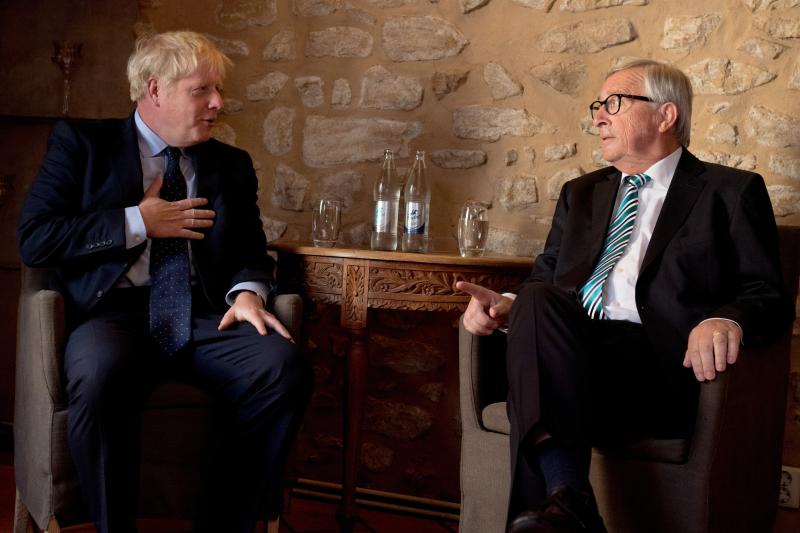Britain's political disintegration
- By Heiko Khoo
 0 Comment(s)
0 Comment(s) Print
Print E-mail China.org.cn, September 17, 2019
E-mail China.org.cn, September 17, 2019

Britain's political system is disintegrating. Long held up as a model of stability, its unwritten constitution unifies laws, precedents and traditions that depend on goodwill and "gentlemanly" consensus for their efficacy. This is no more. Brexit is testing the key institutions of civil governance: the monarchy, parliament, the main political parties and the courts.
When Parliament was prorogued or suspended, it was done by order of the Queen on advice from Prime Minister Boris Johnson. In theory the Queen could have refused; and her decisions cannot be contested in court. But as she is supposed to remain above politics this would have overturned hundreds of years of the constitutional "agreement."
When two business partners fall out over money and when cordial relations between them break down, they often part company with the words "see you in court." This is where we are at with regards to the relationship between the government and parliament. The highest court in Scotland has declared the suspension of parliament illegal. It decided that the PM's advice misled the monarch, as prorogation was actually designed to avoid parliamentary scrutiny and to force through a no-deal Brexit. This Scottish court decision contradicts that of the English High Court, which regards the issue as political not judicial, and therefore outside its remit. Britain's highest court, the Supreme Court, will hear appeals on these decisions on September 17.
Parliament voted to instruct the PM to delay Brexit if no deal is reached, but the PM is trying to find a way around this. The possibility even exists that Boris Johnson could be sent to prison for contempt of court. Parliament also demanded that all communications by the PM and his advisors dealing with the decision to suspend parliament be handed to MPs by September 11, a move the government refused on privacy grounds. This issue will also land in court.
After Johnson purged 21 MPs from the parliamentary Tory Party, Jo Johnson, his own brother, resigned from his government post. This was followed by Amber Rudd's resignation from the cabinet and the parliamentary party. She claims there is no real serious attempt to strike a deal with the EU. Boris Johnson has twice asked parliament to call an election and was rebutted both times because MPs feared he would use some underhand trick to force through a no-deal Brexit. The man behind the government's apparently bizarre maneuvers is Dominic Cummings. He is an unelected advisor to the PM who despises MPs, hates the Tory party, and is described by former colleagues as an anarchist out to destroy the traditional political system.

In William Shakespeare's play, Lord Polonius says of Hamlet: "Though this be madness, yet there is method in it." This can also be said of Boris Johnson's behavior. He is positioning himself as the uncompromising and determined voice of the people, prepared to stand up to petty minded MPs. And by these means he hopes to ride on a wave of popular anger to secure victory at the impending General Election. Alternatively, if MPs fear a no-deal abyss and some sort of deal is agreed with the EU just before the Halloween deadline, they might be panicked into voting for it notwithstanding their reservations. This is particularly true, as despite cross party unity in opposing a no-deal Brexit, the overwhelming majority of MPs still fear the possibility that a Jeremy Corbyn-led Labor Party might win the General Election.
Now that the government no longer commands a majority in parliament, it does not require the support of the Democratic Unionist Party's (DUP) 10 MPs who kept Theresa May's government in power through a "confidence and supply arrangement." As a last throw of the dice, PM Johnson may try to strike a deal with the Republic of Ireland by dumping the DUP, perhaps hinting to the Republic that a referendum on Irish unification might be possible in the foreseeable future. Current opinion polls indicate that nearly half of the public in Northern Ireland support unification.
If the North and South of Ireland were to retain EU regulations and customs rules in relation to agricultural produce, while mainland Britain operates under different rules, it might, in theory, overcome some of the cross party parliamentary resistance to an amended Brexit deal. But simmering divisions between pro-republican Catholic communities and Protestant unionists could easily be inflamed. Indeed, a number of recent sectarian marches have turned violent.
Nevertheless, having expelled so many Tory loyalist MPs, perhaps it would not be such a big step for Johnson to jettison the unionists altogether in his attempt to steal the cloak of the Brexit Party. But this is a path fraught with difficulty. The official name of the Tory Party is the Conservative and Unionist Party. Although the right wing of the party is happy with a no-deal Brexit it will certainly revolt against any steps that dissolve the union with Northern Ireland.
In addition, an impending General Election is likely to result in a landslide victory in Scotland for the pro-EU and pro-independence Scottish National Party. And they are demanding a new referendum on independence. So the United Kingdom would be pushed further towards dissolution.
The historic bonds that hold Britain's nations, institutions and social classes together are unraveling. Although this is not a revolution, it does signify that traditional authority is breaking down, and as the cohesion of Britain's constitutional and social order crumbles, violent unrest and upheaval is increasingly likely.
Heiko Khoo is a columnist with China.org.cn. For more information please visit:
http://china.org.cn/opinion/heikokhoo.htm
Opinion articles reflect the views of their authors, not necessarily those of China.org.cn.
If you would like to contribute, please contact us at opinion@china.org.cn.






Go to Forum >>0 Comment(s)